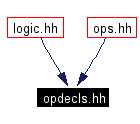
This graph shows which files directly or indirectly include this file:

Go to the source code of this file.
Defines | |
| #define | oln_arith_declare_binrecval_functor_(OPNAME, OPCODE) |
| #define | oln_arith_declare_binrecvalcst_functor_(OPNAME, OPCODE_CST) |
| #define | oln_arith_declare_binrecval_functors_(OPNAME, OPCODE, OPCODE_CST) |
| #define | oln_arith_declare_binfixedtype_functor_(OPNAME, OPCODE, TYPE) |
| #define | oln_arith_declare_binfixedtypecst_functor_(OPNAME, OPCODE_CST, TYPE) |
| #define | oln_arith_declare_binfixedtype_functors_(NAME, TYPE, CODE, CODE_CST) |
| #define | default_functor_return_type_(OPNAME, I1, I2) |
| Shortcut. | |
| #define | default_functor_type_cst_(OPNAME, I1, T2) |
| Shortcut. | |
| #define | default_functor_return_type_cst_(OPNAME, I1, T2) typename default_functor_type_cst_(OPNAME, I1, T2)::result_type |
| Shortcut. | |
| #define | oln_arith_declare_binop_procs_(OPNAME) |
| Declare front-end functions. | |
| #define | oln_arith_declare_binopcst_procs_(OPNAME) |
| Apply OPNAME with a constant as second operand. | |
| #define | oln_arith_declare_all_binop_procs_(OPNAME) |
| #define | oln_arith_declare_nongenericbinop_procs_(OPNAME) |
| Same as oln_arith_declare_nongenericbinop_procs_ but for non template functors. | |
| #define | oln_arith_declare_nongenericbinopcst_procs_(OPNAME) |
| Apply OPNAME with a constant as second operand. | |
| #define | oln_arith_declare_all_nongenericbinop_procs_(OPNAME) |
| #define | oln_arith_declare_unfixedtype_functor_(OPNAME, TYPE, OPCODE) |
| #define | oln_arith_declare_nongenericunop_procs_(OPNAME) |
| #define | oln_arith_declare_unop_procs_(OPNAME) |
Definition in file opdecls.hh.
|
|
Value: typename f_##OPNAME<oln_value_type(I1), \
oln_value_type(I2), \
ntg_return_type(OPNAME, \
oln_value_type(I1), \
oln_value_type(I2))>::result_type
Definition at line 163 of file opdecls.hh. |
|
|
Value: f_##OPNAME##_cst<oln_value_type(I1), \
T2, \
ntg_return_type(OPNAME, \
oln_value_type(I1), \
T2)>
Definition at line 171 of file opdecls.hh. |
|
|
Value: oln_arith_declare_binop_procs_(OPNAME) \ oln_arith_declare_binopcst_procs_(OPNAME) Definition at line 268 of file opdecls.hh. |
|
|
Value: oln_arith_declare_nongenericbinop_procs_(OPNAME) \ oln_arith_declare_nongenericbinopcst_procs_(OPNAME) Definition at line 319 of file opdecls.hh. |
|
|
Value: struct f_##OPNAME : std::binary_function< const TYPE&, const TYPE&, TYPE> \ { \ const result_type \ operator()(first_argument_type val1, \ second_argument_type val2) const \ { \ return OPCODE; \ } \ } /* no ; */
Definition at line 123 of file opdecls.hh. |
|
|
Value: oln_arith_declare_binfixedtype_functor_(NAME, CODE, TYPE); \ oln_arith_declare_binfixedtypecst_functor_(NAME, CODE_CST, TYPE) Definition at line 158 of file opdecls.hh. |
|
|
Value: struct f_##OPNAME##_cst: std::unary_function<const TYPE, TYPE > \ { \ f_##OPNAME##_cst(TYPE cst) : cst_(cst) {} \ \ const result_type \ operator()(argument_type val) const \ { \ return OPCODE_CST; \ } \ private: \ TYPE cst_; \ } /* no ; */
Definition at line 141 of file opdecls.hh. |
|
|
Value: template<class T1, class T2, class Ret> \ struct f_##OPNAME : std::binary_function<const T1&, \ const T2&, \ Ret> \ { \ typedef f_##OPNAME self_type; \ typename self_type::result_type \ operator()(typename self_type::first_argument_type val1, \ typename self_type::second_argument_type val2) const \ { \ return OPCODE; \ } \ }; \ \ template <class T1, class T2 = T1> \ struct default_f_##OPNAME \ : public f_##OPNAME< T1, T2, ntg_return_type(OPNAME, T1, T2)> \ {} /* no ; */ Produce a functor named f_##OPNAME using the code OPCODE.
Definition at line 55 of file opdecls.hh. |
|
|
Value: oln_arith_declare_binrecval_functor_(OPNAME, OPCODE); \ oln_arith_declare_binrecvalcst_functor_(OPNAME, OPCODE_CST)
Definition at line 113 of file opdecls.hh. |
|
|
Value: template<class T1, class T2, class Ret> \ struct f_##OPNAME##_cst : std::unary_function<const T1&, \ Ret> \ { \ typedef f_##OPNAME##_cst self_type; \ f_##OPNAME##_cst(T2 cst) : cst_(cst) {} \ \ typename self_type::result_type \ operator()(typename self_type::argument_type val) const \ { \ return OPCODE_CST; \ } \ private: \ T2 cst_; \ } /* no ; */ Produce a functor named f_##OPNAME using the code OPCODE. The object is constructed using a constant.
Definition at line 86 of file opdecls.hh. |
|
|
Value: /* Standard application of OPNAME */ \ template<class I1, class I2> inline \ typename mute<I1, typename f_##OPNAME::result_type>::ret \ OPNAME(const abstract::image<I1>& input1, const abstract::image<I2>& input2) \ { \ return apply2<f_##OPNAME >(input1, input2); \ } \ \ /* Same as above, plus conversion. */ \ template<class C, class B, class I1, class I2> inline \ typename mute<I1, \ typename convoutput<C, B, typename f_##OPNAME::result_type>::ret>::ret \ OPNAME(const convert::abstract::conversion<C, B>& conv, \ const abstract::image<I1>& input1, const abstract::image<I2>& input2) \ { \ return apply2(convert::compconv2(conv, f_##OPNAME()), \ input1, input2); \ }
Definition at line 273 of file opdecls.hh. |
|
|
Value: template<class I, class T> inline \ typename mute<I, typename f_##OPNAME##_cst::result_type>::ret \ OPNAME##_cst(const abstract::image<I>& input, T val) \ { \ return apply(f_##OPNAME##_cst(val), input); \ } \ \ /* Same as above, plus conversion. */ \ template<class C, class B, class I, class T> inline \ typename mute<I, \ typename convoutput<C, B, \ typename f_##OPNAME##_cst::result_type>::ret>::ret \ OPNAME##_cst(const convert::abstract::conversion<C, B>& conv, \ const abstract::image<I>& input, T val) \ { \ return apply(convert::compconv1(conv, f_##OPNAME##_cst(val)), \ input); \ }
Definition at line 297 of file opdecls.hh. |
|
|
Value: /* Standard application of OPNAME */ \ template<class I> inline \ typename mute<I, typename f_##OPNAME::result_type>::ret \ OPNAME(const abstract::image<I>& input1) \ { \ return apply<f_##OPNAME >(input1); \ } \ \ /* Same as above, plus conversion. */ \ template<class C, class B, class I> inline \ typename mute<I, \ typename convoutput<C, B, typename f_##OPNAME::result_type>::ret>::ret \ OPNAME(const convert::abstract::conversion<C, B>& conv, const abstract::image<I>& input1) \ { \ return apply(convert::compconv2(conv, f_##OPNAME()), input1); \ } Definition at line 338 of file opdecls.hh. |
|
|
Value: struct f_##OPNAME : std::unary_function< const TYPE&, TYPE> \ { \ const result_type operator()(argument_type val) const \ { \ return OPCODE; \ } \ } /* no ; */ Definition at line 328 of file opdecls.hh. |
|
|
Value: /* Standard application of OPNAME */ \ template<class I> inline \ typename mute<I, typename f_##OPNAME<oln_value_type(I)>::result_type>::ret \ OPNAME(const abstract::image<I>& input1) \ { \ return apply(f_##OPNAME<oln_value_type(I)>(), input1); \ } \ \ /* Same as above, plus conversion. */ \ template<class C, class B, class I> inline \ typename mute<I, \ typename convoutput<C, B, \ typename f_##OPNAME<oln_value_type(I)>::result_type>::ret>::ret \ OPNAME(const convert::abstract::conversion<C>& conv, const abstract::image<I>& input1) \ { \ return apply(convert::compconv2(conv, f_##OPNAME<oln_value_type(I)>()), input1); \ } Definition at line 356 of file opdecls.hh. |
 1.3.6-20040222
1.3.6-20040222